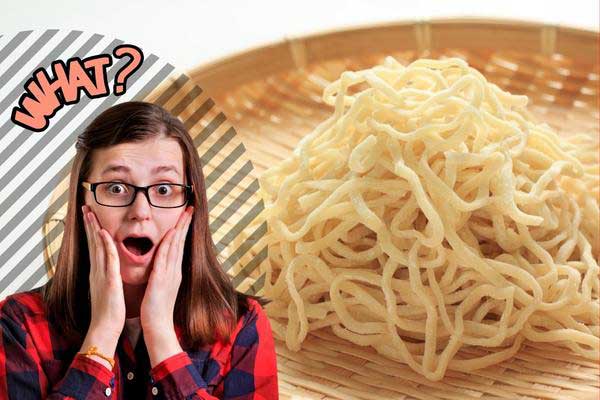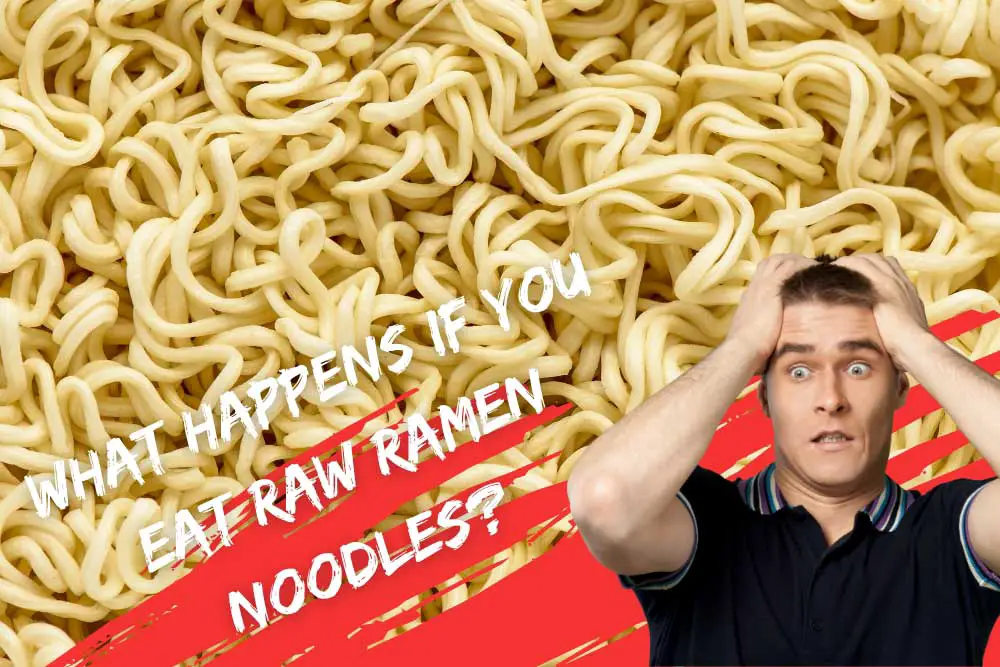Have you ever wondered what could happen if you ate raw ramen noodles? Many people are familiar with the convenience of boiling a packet of instant ramen in hot water and then enjoying the resulting steaming bowl of deliciousness.
But while cooking ramen noodles is the most common way to enjoy them, it may surprise some to know that there is actually more than one way to consume them. Eating raw ramen noodles carries its own risks and benefits that you should be aware of before making any decisions.
Eating raw ramen noodles can cause digestive issues such as nausea, vomiting, and diarrhea. Eating raw ramen noodles can also cause choking due to the uncooked noodles being difficult to swallow. Additionally, raw ramen noodles may contain bacteria that can cause food poisoning if consumed. Therefore, it is best to cook ramen noodles before eating them.
In this article, we’ll take a deep dive into what happens when you eat raw ramen noodles, including the potential health benefits and risks associated with doing so.
What are Raw Ramen Noodles
Raw ramen noodles are a type of dried, precooked noodle that can be used in many different recipes. The noodles are typically made from wheat flour, salt, water, and other ingredients such as seasonings and preservatives. They have become an incredibly popular food in recent years due to their convenience and versatility. Raw ramen noodles come in a variety of shapes and sizes and can be purchased either dry or pre-cooked.
Raw ramen noodles have no real flavor on their own and take on the flavor of the ingredients they are cooked with. They are often served in a broth or soup-like dish with other ingredients such as vegetables, meat, spices, and various sauces. The noodles also make a great addition to salads or stir-fries as well as being served cold with dipping sauces.
One benefit of eating raw ramen noodles is that they provide an easy way to get your daily intake of carbs without having to go through the hassle of cooking them from scratch. This makes them perfect for busy lifestyles or when you don’t have the time or energy to prepare a meal from start to finish. Additionally, because raw ramen noodles contain very few calories per serving, they can make for an excellent light meal option that won’t leave you feeling overly full after eating it.

Nutritional Benefits of Eating Raw Ramen Noodles
Ramen noodles offer many nutritional benefits when consumed in their raw form. Raw ramen is a good source of essential vitamins and minerals, such as iron, zinc, folate, thiamin, and niacin. It also contains dietary fiber which helps keep your digestive system healthy. Additionally, raw ramen has a decent amount of protein per serving, providing 7-8g per cup cooked. This can be especially beneficial for those looking to increase their protein intake without the added calories from other sources like meat or dairy.
Raw ramen is also considered to be gluten-free and low in fat and sodium. This makes it an ideal choice for those who are following a specific diet or trying to watch their salt intake. Furthermore, raw ramen noodles are very versatile and can be used to make a variety of dishes like salads or stir-fries with vegetables and other grains like quinoa or millet.
The most important thing to remember about eating raw ramen noodles is that they must be properly washed before consuming them. This helps remove any dirt or bacteria that may have built up on the surface of the noodles during storage or shipping. After washing them thoroughly with cold water, you can either cook them according to package instructions or add them directly into your dish for an interesting texture and flavor profile.
Risks Associated with Eating Raw Ramen Noodles
Raw ramen noodles can be a tempting snack, but they can also come with some risks. Eating raw ramen noodles can be dangerous if the noodles are made with wheat-based flour. Wheat contains gluten, which is an allergen for some people and can cause an allergic reaction in individuals who are sensitive to it. Additionally, wheat-based flour may contain trace amounts of harmful bacteria such as E. coli or salmonella. These bacteria can cause food poisoning and other serious illnesses if consumed in large amounts or over an extended period of time.
The other risk associated with eating raw ramen noodles is choking. Since the noodles are not cooked, they are much harder to chew and swallow than cooked ones. This can lead to choking if the pieces of noodles become stuck in the throat or lungs while trying to swallow them down.
Finally, eating raw ramen noodles may increase your risk of cavities due to their high carbohydrate content and stickiness after being chewed up. The carbohydrates left on the teeth can feed bacteria that produce acid that damages tooth enamel and eventually lead to cavities if not addressed adequately by brushing or flossing regularly.
How to Properly Prepare and Consume Raw Ramen Noodles
When it comes to preparing and consuming raw ramen noodles, knowing how to do so properly is essential. It is not recommended to eat them as they come out of the package, as doing so could cause a variety of health problems.
The best way to properly prepare and consume raw ramen noodles is by soaking them in hot water for several minutes until they are tender. You can also add other ingredients such as vegetables or meat to enhance the flavor and nutritional value of the noodles. Once the noodles are ready, you can season them with soy sauce, mirin (rice vinegar), and other condiments.
It is important to be mindful of the cooking time when preparing raw ramen noodles, since overcooking them can lead to an unpleasant texture and taste. Additionally, avoid eating raw ramen that has been sitting in water for a long time as this could potentially make you sick due to bacterial growth.
Finally, it is important to remember that raw ramen should be consumed immediately after preparation in order to ensure its freshness and quality. If any leftover cooked ramen remains, it should be stored in an airtight container in the refrigerator and consumed within two days.
Should You Eat Raw Ramen Noodles
When it comes to the question of whether or not you should eat raw ramen noodles, the answer is a definitive no. Eating raw ramen noodles can be dangerous and may cause severe health issues. Raw ramen noodles contain bacteria and toxins that can lead to food poisoning and other gastrointestinal issues such as stomach cramps, vomiting, and diarrhea. Additionally, there are a number of potential choking hazards associated with eating raw noodles. The uncooked noodles are difficult to swallow and could get stuck in your throat or windpipe if not properly chewed.
For those who enjoy the taste of raw ramen noodles, proper preparation is essential for minimizing health risks and preventing choking. First, make sure that the noodle package is not expired or contaminated in any way. Then, wash the noodles thoroughly before consumption to remove any dirt or dirt particles that may have settled on them during storage. Next, soak the noodles in boiling water for at least two minutes before consuming them. This will kill any bacteria that may be present on the surface of the noodles and also soften them so they are easier to swallow without getting stuck in your throat.
Final Words
While some people enjoy eating raw ramen noodles due to their unique texture and flavor, this practice can be dangerous due to potential bacterial contamination and choking hazards associated with consuming uncooked food products. It is important to take extra precautions when preparing raw ramen noodles by washing them thoroughly and soaking them in hot water before consumption in order to reduce the risk of food poisoning and choking incidents.
Eating raw ramen noodles can be a tasty and nutritious snack, but it is important to understand the potential risks associated with consuming them. Raw ramen noodles may contain bacteria or other microorganisms that can cause foodborne illnesses, so it is essential to take steps to properly prepare and consume them. While there are some nutritional benefits to eating raw ramen noodles, such as added fiber, it is ultimately up to you to decide if they are worth the risk. If you choose to eat raw ramen noodles, then it is important to watch out for warning signs and take proper precautions. Make sure you look out for any changes in smell, texture, or taste that could indicate spoiled noodles before consuming them.


